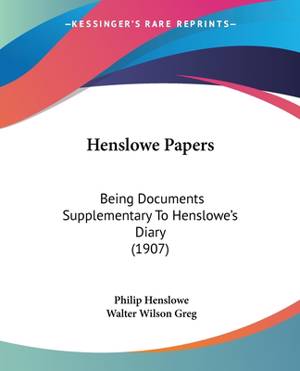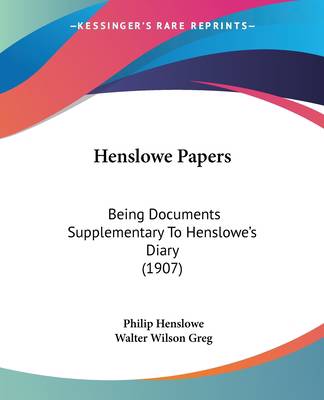
- Afhalen na 1 uur in een winkel met voorraad
- Gratis thuislevering in België vanaf € 30
- Ruim aanbod met 7 miljoen producten
- Afhalen na 1 uur in een winkel met voorraad
- Gratis thuislevering in België vanaf € 30
- Ruim aanbod met 7 miljoen producten
Zoeken
Henslowe Papers
Being Documents Supplementary To Henslowe's Diary (1907)
Philip Henslowe
Paperback | Engels
€ 36,95
+ 73 punten
Uitvoering
Omschrijving
The Henslowe Papers: Being Documents Supplementary to Henslowe's Diary (1907) is a book that contains additional documents related to the diary of Philip Henslowe, a prominent figure in the Elizabethan theatre scene. The diary itself is a valuable historical document that provides insights into the workings of the theatre industry during the late 16th and early 17th centuries. However, the Henslowe Papers add another layer of information to this already rich historical record. The documents included in the book were discovered by J. Payne Collier, a prominent scholar of Elizabethan theatre, and were published for the first time in 1907. They include a wide range of materials, such as contracts, receipts, and correspondence, that shed light on various aspects of the theatre business. Some of the most interesting documents in the collection relate to the productions of well-known playwrights such as William Shakespeare and Christopher Marlowe. For example, there is a contract for the production of Marlowe's play Doctor Faustus, as well as receipts for payments made to Shakespeare's company, the Lord Chamberlain's Men. In addition to these theatrical documents, the Henslowe Papers also contain personal correspondence and financial records that offer a glimpse into Henslowe's private life. For example, there are letters from Henslowe's wife and son, as well as records of his investments and property holdings. Overall, the Henslowe Papers provide a fascinating window into the world of Elizabethan theatre and the life of one of its most important figures. This book will be of interest to scholars and students of theatre history, as well as anyone interested in the social and cultural history of early modern England.This scarce antiquarian book is a facsimile reprint of the old original and may contain some imperfections such as library marks and notations. Because we believe this work is culturally important, we have made it available as part of our commitment for protecting, preserving, and promoting the world's literature in affordable, high quality, modern editions, that are true to their original work.
Specificaties
Betrokkenen
- Auteur(s):
- Uitgeverij:
Inhoud
- Aantal bladzijden:
- 202
- Taal:
- Engels
Eigenschappen
- Productcode (EAN):
- 9781120291424
- Verschijningsdatum:
- 15/10/2009
- Uitvoering:
- Paperback
- Formaat:
- Trade paperback (VS)
- Afmetingen:
- 190 mm x 235 mm
- Gewicht:
- 353 g

Alleen bij Standaard Boekhandel
+ 73 punten op je klantenkaart van Standaard Boekhandel
Beoordelingen
We publiceren alleen reviews die voldoen aan de voorwaarden voor reviews. Bekijk onze voorwaarden voor reviews.











